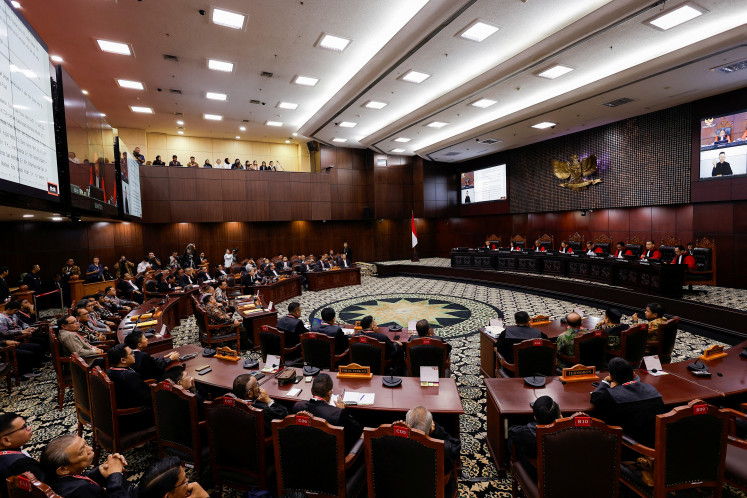BI raises rate, relaxes macroprudential policy
See you next time: Bank Indonesia Governor Perry Warjiyo waves to journalists after a media briefing at his office in Jakarta on Thursday
Change Size

S
ee you next time: Bank Indonesia Governor Perry Warjiyo waves to journalists after a media briefing at his office in Jakarta on Thursday. Bank Indonesia increased the Seven-Day Reverse Repo Rate (BI7DRR) 25 basis points to 6 percent as part of the central bank’s policy to lower the current account deficit. (Antara/Muhammad Adimaja)
Bank Indonesia (BI) has decided to raise its benchmark rate in November as a preemptive policy against a United States’ Federal Reserves rate hike that will likely happen next month, while also relaxing some of its macroprudential policies to ease banks’ liquidity management.
Following a two-day board of governors meeting that ended on Thursday, the central bank raised its seven-day reverse repo rate by 25 basis points (bps) to 6 percent. Lending and deposit facilities were also increased by 25 bps to 5.25 percent and 6.75 percent, respectively.
This means that BI has raised its interest rate six times since May, with a total increase of 175 bps, as part of its efforts to stabilize the rupiah amid high volatility in the global market. The uncertainty is largely driven by ongoing trade tensions between the US and China, as well as the Fed’s normalization policy.
BI Governor Perry Warjiyo said the move was consistent with the central bank’s efforts to narrow the current account deficit to a manageable level, adding that the decision would also boost the attractiveness of Indonesian assets ahead of an incoming increase in global interest rates.
The market appeared to have reacted positively to the move, with the Jakarta Composite Index (JCI) — the main gauge of the Indonesia Stock Exchange (IDX) — ending the day 1.6 percent stronger at 5.955,73 compared to Wednesday’s closing. Foreign investors, meanwhile, recorded a net buy of Rp 1.37 trillion (US$93.29 million).
The rupiah appreciated 0.8 percent to Rp 14,665 against the US dollar after the announcement in the spot market, according to Bloomberg data. As of Wednesday, the rupiah had depreciated 8.25 percent year-to-date (ytd), BI data revealed.
According to Center of Reform on Economic (CORE) Indonesia research director Piter Abdullah, BI’s latest move was rather unexpected and revealed the central bank’s commitment to maintaining its “ahead of the curve” stance, adding that the decision could lead to less room for BI to adjust its policy rate next year.
But the latest hike was by no means a guarantee that BI will hold its rate next month as the Fed was widely expected to raise its rate for the fourth time this year, he said.
“However small or big the Fed’s interest rate increase in December, it will trigger a market reaction. If the market’s response was strong, BI needs to respond with another rate hike.”
Piter projected another 25-bps increase between December and January next year.
Asian Development Bank (ADB) Institute economic observer Eric Sugandi agreed that BI’s latest hike showed its anticipatory stance against the expected Fed Funds Rate (FFR) increase, adding that the central bank could raise its rate in December by another 25 bps should pressures on the rupiah increase.
BI also relaxed its macroprudential liquidity buffer (PLM) policy, allowing banks to sell 4 percent of their owned securities to the central bank through a repurchase agreement (repo), from the previous 2 percent cap.
It also relaxed its average primary reserve requirement (GWM average) — the amount of banks’ liquidity in BI’s reserve — to 3 percent in a two-week average, from the previous 2 percent average in a two-week period.
“The basis of our policy to issue [new] requirements on the GWM average and PLM was to improve the flexibility and distribution of interbank liquidity,” said Perry.
Meanwhile, the central bank kept its countercyclical capital buffer (CCB) at 0 percent and the macroprudential intermediation ratio (RIM) at between the 80 and 92 percent target range.
BI also issued a regulation on new derivative transaction instruments, namely interest rate swaps, which was based on the Jakarta Interbank Offered Rate (JIBOR), as well as the overnight index swap, which will be based on the Indonesia Overnight Index Average (IndONIA).
The two new instruments will be able to be transacted between banks soon after they declare their readiness to trade it, Perry said.









